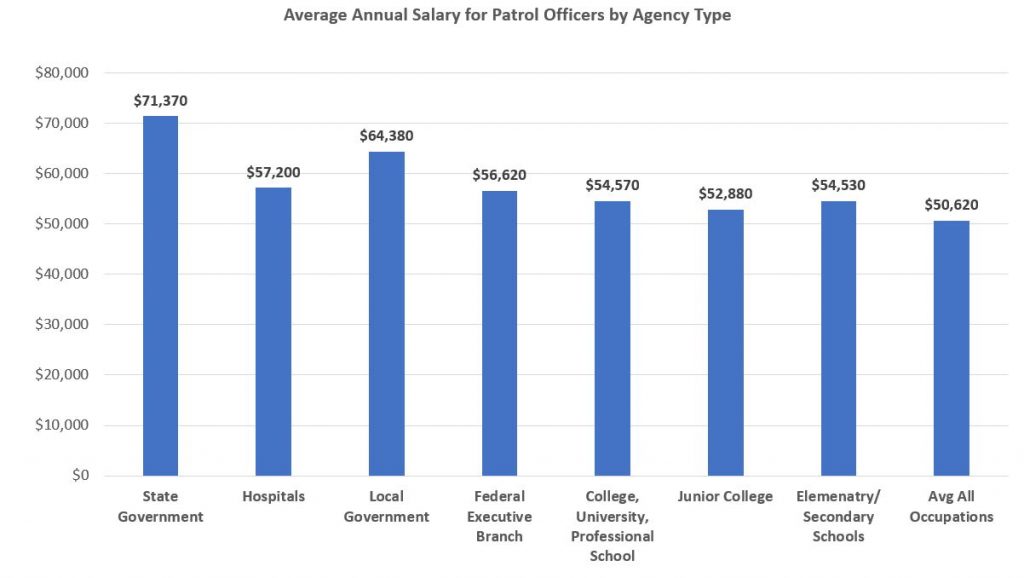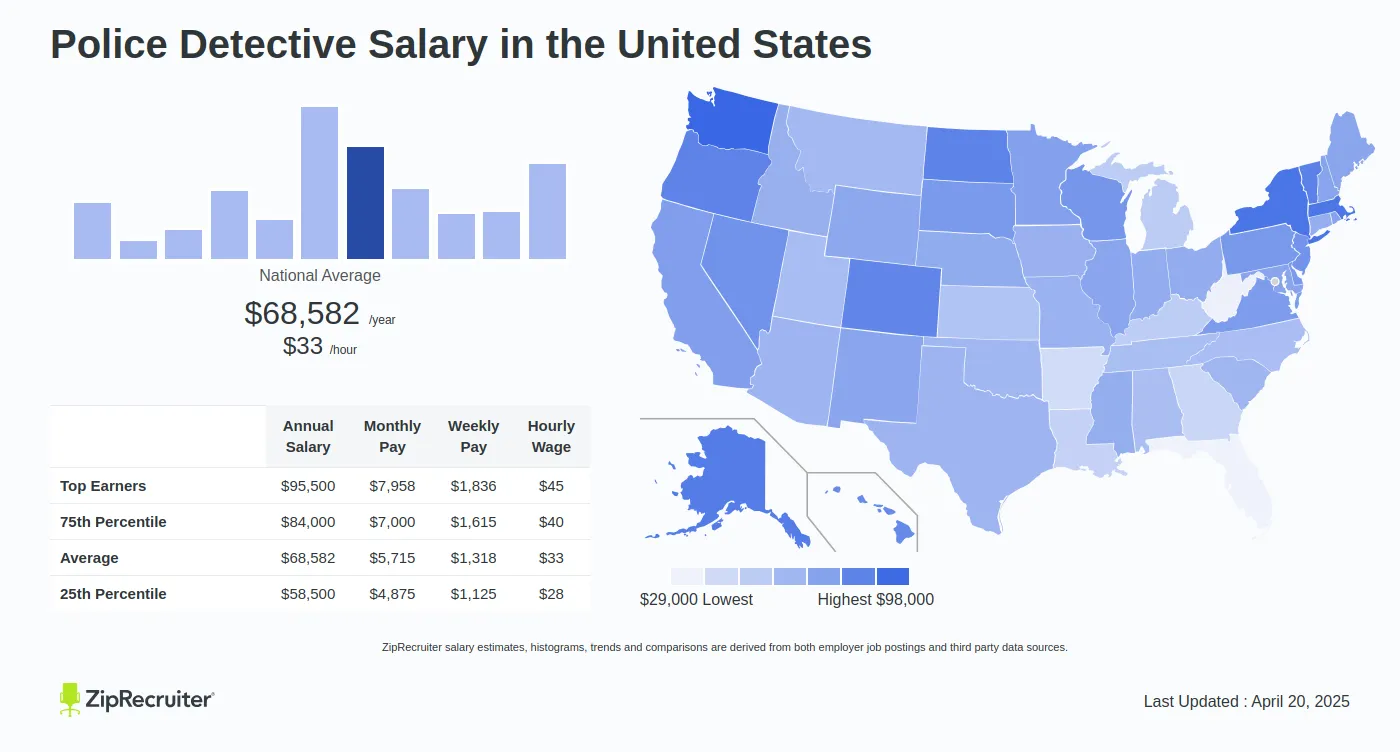Police Detective Salary USA: A Comprehensive Guide To Careers And Earnings
Police detectives play a critical role in maintaining public safety and enforcing the law across the United States. Their responsibilities range from investigating crimes to gathering evidence and testifying in court. If you're considering a career as a police detective or are curious about their salaries, this article will provide in-depth insights into their earnings, career paths, and factors influencing their pay.
As a profession that requires dedication, expertise, and a commitment to justice, police detectives are essential to society. Understanding the salary structure of police detectives in the USA is crucial for anyone interested in pursuing this career or simply wanting to know more about law enforcement compensation.
This article explores the average police detective salary, factors influencing pay, career advancement opportunities, and other relevant details. Whether you're an aspiring detective, a researcher, or someone looking for accurate information, this guide has everything you need to know.
Read also:Mugshots Oregon Bend A Comprehensive Guide To Public Records And Legal Insights
Table of Contents
- Introduction to Police Detective Salaries
- Average Police Detective Salary in the USA
- Factors Affecting Police Detective Salaries
- Career Advancement and Salary Growth
- Benefits and Perks for Police Detectives
- Training and Education Requirements
- Police Detective Salaries by States
- Job Outlook for Police Detectives
- Comparison with Other Law Enforcement Roles
- Conclusion and Final Thoughts
Introduction to Police Detective Salaries
Police detectives are highly skilled professionals who specialize in investigating crimes and ensuring justice is served. Their work involves analyzing evidence, interviewing witnesses, and collaborating with other law enforcement agencies. Understanding their salaries is important, as it reflects the value society places on their contributions.
Why Salaries Matter
The salary of a police detective is influenced by various factors, including experience, location, and rank. It is essential to recognize that these professionals often work long hours, face dangerous situations, and require extensive training. Their compensation should reflect the demands and risks associated with their roles.
For aspiring detectives, knowing the potential earnings can help in making informed career decisions. Moreover, understanding salary trends can assist policymakers in ensuring fair compensation for law enforcement officers.
Average Police Detective Salary in the USA
According to the U.S. Bureau of Labor Statistics (BLS), the median annual wage for police detectives and criminal investigators was $86,940 as of May 2021. However, salaries can vary significantly depending on several factors, including geographic location, years of experience, and specific job duties.
Breakdown of Salary Ranges
- Entry-level detectives: $50,000 – $60,000 per year
- Mid-career detectives: $65,000 – $80,000 per year
- Senior detectives: $90,000 – $120,000 per year
These ranges provide a general idea of what detectives can expect to earn throughout their careers. However, individual salaries may differ based on local economic conditions and departmental budgets.
Factors Affecting Police Detective Salaries
Several factors influence the salary of a police detective in the USA. Understanding these factors can help individuals gauge their earning potential and make strategic career decisions.
Read also:Joseph Z Biography The Remarkable Life Of A Visionary Leader
Experience and Seniority
Like most professions, experience plays a significant role in determining a detective's salary. Entry-level detectives typically start at lower pay scales, while those with years of experience and proven track records command higher salaries.
Geographic Location
Salaries can vary widely depending on the state or city where a detective works. Urban areas with higher crime rates or larger police forces tend to offer higher salaries to attract qualified candidates. For example, detectives in New York City or Los Angeles may earn more than those in smaller towns.
Education and Certifications
While a high school diploma and police academy training are the minimum requirements, additional education and certifications can enhance a detective's earning potential. Advanced degrees in criminal justice or related fields can lead to promotions and higher pay.
Career Advancement and Salary Growth
Police detectives have ample opportunities for career advancement, which often translates to increased salaries. As they gain experience and demonstrate leadership skills, detectives can move into supervisory roles or specialize in specific areas of investigation.
Promotion Opportunities
Within police departments, detectives can advance to roles such as sergeant, lieutenant, or captain. Each promotion typically comes with a salary increase and additional responsibilities. Detectives may also choose to specialize in areas like cybercrime, forensics, or counterterrorism, which can lead to higher-paying positions.
Special Assignments
Some detectives work on special task forces or federal agencies, where they may receive additional compensation. These assignments often require specialized skills and can provide valuable experience for career advancement.
Benefits and Perks for Police Detectives
In addition to their base salaries, police detectives enjoy a range of benefits and perks that enhance their overall compensation package. These benefits are designed to support the unique demands of the job and attract top talent to law enforcement roles.
Health and Retirement Benefits
Most police departments offer comprehensive health insurance plans, including medical, dental, and vision coverage. Detectives also receive generous retirement benefits, often in the form of defined benefit pension plans. These benefits ensure financial security for detectives and their families.
Overtime Pay
Due to the nature of their work, detectives frequently work overtime, which is compensated at a higher rate than regular pay. This can significantly boost their annual earnings, especially for those working in high-crime areas or on major cases.
Training and Education Requirements
Becoming a police detective requires a combination of education, training, and experience. While the specific requirements may vary by department, most detectives follow a similar path to achieve their roles.
Police Academy Training
All police officers, including detectives, must complete rigorous training at a police academy. This training covers a wide range of topics, including firearms, self-defense, legal procedures, and community relations. Successful completion of the academy is a prerequisite for employment as a police officer.
Field Experience
After graduation, officers must gain several years of field experience before being eligible for detective roles. This experience provides valuable skills in investigation, evidence collection, and report writing, which are essential for detectives.
Police Detective Salaries by States
Salaries for police detectives can vary significantly across different states. Below is a breakdown of average salaries for detectives in some of the highest-paying states:
Top-Paying States
- California: $115,000 – $130,000 per year
- New York: $100,000 – $120,000 per year
- Illinois: $90,000 – $110,000 per year
- Texas: $75,000 – $95,000 per year
- Florida: $70,000 – $90,000 per year
These figures highlight the importance of geographic location in determining a detective's salary. Detectives in states with higher costs of living or greater demand for law enforcement professionals tend to earn more.
Job Outlook for Police Detectives
The job outlook for police detectives in the USA is generally positive, although it varies by region and department. According to the BLS, employment of detectives and criminal investigators is projected to grow 3% from 2020 to 2030, about as fast as the average for all occupations.
Challenges and Opportunities
While the overall demand for detectives is stable, certain challenges may impact the job market. Budget constraints in some areas could limit hiring, while increasing crime rates in others may create new opportunities. Detectives with specialized skills or advanced education may have an advantage in the job market.
Comparison with Other Law Enforcement Roles
Police detectives are just one of many roles within the broader field of law enforcement. Comparing their salaries with those of other professionals can provide valuable context for aspiring detectives.
Police Officers vs. Detectives
While police officers and detectives share many responsibilities, detectives typically earn more due to their specialized skills and advanced roles. On average, detectives earn approximately 15-20% more than patrol officers, reflecting the additional training and experience required for their positions.
Private Investigators vs. Detectives
Private investigators, who work independently or for private firms, often earn less than police detectives. However, they enjoy greater flexibility and autonomy in their work. Detectives, on the other hand, benefit from the resources and support of law enforcement agencies.
Conclusion and Final Thoughts
In conclusion, police detectives in the USA earn competitive salaries that reflect the demands and importance of their roles. Factors such as experience, location, and education significantly influence their earnings, providing opportunities for career advancement and financial growth.
We encourage readers to explore the resources and training necessary to pursue a career as a police detective. If you found this article helpful, please share it with others who may be interested in law enforcement careers. Additionally, feel free to leave a comment or question below—we'd love to hear from you!
For more information on police detective salaries and careers, refer to authoritative sources such as the U.S. Bureau of Labor Statistics and local police department websites. Stay informed and stay safe!


